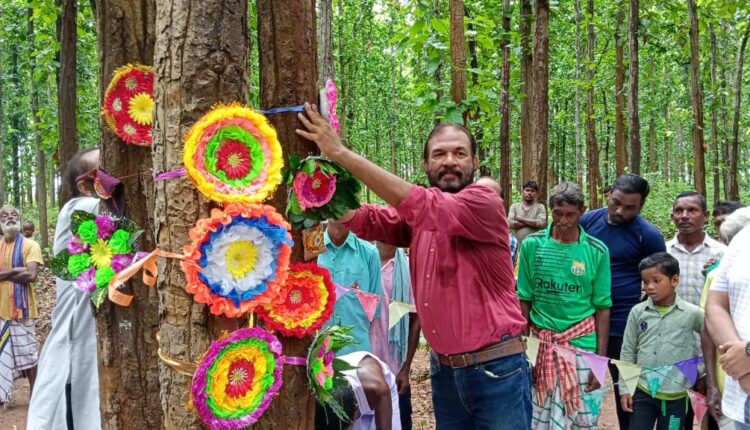Jungle Raksha Bandhan – 20 Years & Going Strong
A 20-year tradition of Jungle Raksha Bandhan unites communities in forest conservation across Odisha, spreading nationwide awareness.
The Forest Department is set to launch a campaign to raise awareness about the critical importance of conserving sal trees and the forests they inhabit. Prakash Chand Gogineni, the regional conservator of forests and field director of Similipal Tiger Reserve, unveiled this plan during a Jungle Raksha Bandhan event held in Hatimada, Suliapada block. He emphasized that sal trees have been extensively cut down in certain areas, often for traditional purposes like making toothbrushes, which has significantly impacted the ecosystem.
Gogineni pointed out that many forest dwellers, particularly those from the Santhal tribal community, are unaware of the essential role these trees play in maintaining the ecological balance. He highlighted the need for these communities to actively protect the sal trees, noting that the Forest Department plans to lead initiatives focused on preserving sal tree roots and encouraging the growth of new plants. “The success of these efforts will largely depend on how effectively we can spread awareness among the local tribes,” Gogineni stated.
The Jungle Raksha Bandhan event, which took place in Mayurbhanj district, has deep roots dating back to 2004. That year, the villagers of Hatimada, alongside the local MLA, DFO, and other officials, came together to organize the first such event in India, drawing participation from around 300 villages. Led by Bibekananda Pattnaik, the event marked the beginning of a unique movement aimed at forest conservation. “The event was started as a way to bring women to the forefront,” Pattnaik shared. “In India, when decisions are made, men usually sit in front while women stand in the back. But with this event, women have come forward, as Rakhi is mainly celebrated by women.”
Support Independent Journalism? Keep us live.
The Jungle Raksha Bandhan movement soon spread beyond Odisha’s borders, inspiring neighboring Jharkhand to adopt the practice in 2005. What began as an inventive approach to engage communities in forest conservation has now evolved into a powerful medium of protest against deforestation. This year, Pattnaik took his advocacy further by engaging with the Forest Minister in Bhubaneswar, leading to a celebration of Jungle Raksha Bandhan at Ekamra Kanan as well.
Pattnaik is passionate about making this event an official nationwide observance, stating, “I have spoken with the Forest Minister about making this event official, so it can be celebrated everywhere as a protest that is celebrated through this.” His vision is for the Jungle Raksha Bandhan to become a widespread movement that galvanizes communities across India to protect their forests and trees.
Baripada DFO T Uma Mahesh added that the event, organized by Mayurbhanj Swachhasevi Samukhya (MSS), originally aimed to engage women in forest protection efforts and address the increasing problem of forest fires, which pose a significant challenge for the department. MSS President Vivekananda Pattnaik, who has been leading this initiative for the past 22 years, remarked on the importance of continuing this tradition to safeguard the forests.
Meanwhile, in Ganjam, a group of women from the Kalinga Vysya Sangha showed their appreciation for members of the armed forces, police, healthcare, and fire departments by sending them handcrafted rakhis made from food grains and spices. Roja Subudhi, president of the women’s wing, noted that they have been making these rakhis for three years, using natural dyes and materials, and hope to continue this heartfelt gesture.


Comments are closed.